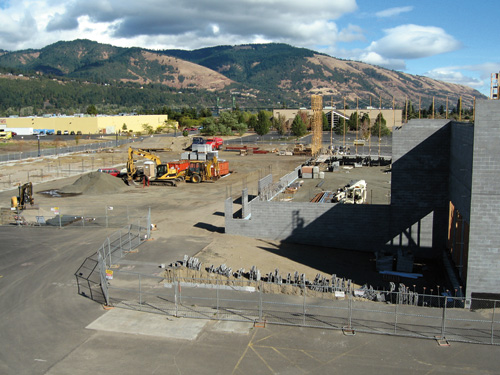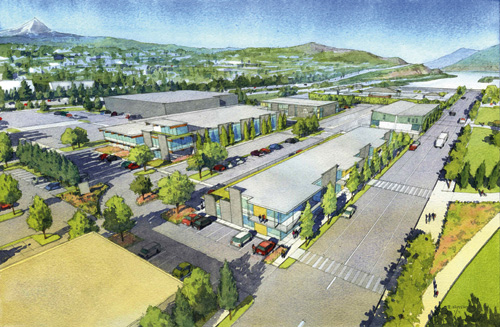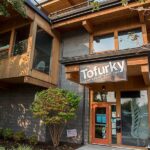 At a time when the economies of many Oregon cities and towns are fragile and shrinking, Hood River is enjoying slow and steady growth.
At a time when the economies of many Oregon cities and towns are fragile and shrinking, Hood River is enjoying slow and steady growth.
By Abby Christopher
 |
The Hood River Waterfront Business Park: A new building for Hood Technology is being constructed and a headquarters for Turtle Island Foods is being developed. Both will open in 2012. |
At a time when the economies of many Oregon cities and towns are fragile and shrinking, Hood River is enjoying slow and steady growth. Hood Technology and Turtle Island Foods, both small privately held businesses already established in the City of Hood River, have invested more than $14.4 million combined to develop light industrial plant and offices for their businesses in the Port of Hood River’s Waterfront Business Park.
In September, Hood Tech moved some of its employees into its new 40,000-square-foot digs at the waterfront. Construction at Turtle Island’s new 33,000-square-foot property will be completed by next summer, according to property developer Jeff Pickhardt of Key Development. Key Development and Naito Development have announced 2012-2013 plans for new construction and renovation in the port as well, including mixed-use office buildings and retail businesses.
While the state reported a 9.6% unemployment rate in August, Hood River County was at 7.2%. And according to state economic analyst Josh Lehner, over the past two years employment in Hood River has consistently been 1.6-2.9 percentage points ahead of the state overall.
Hood Tech is expected to add approximately 20 jobs to its staff, which can range from 75 to 150 depending on production needs, according to president and founder Andy von Flowtow. Hood Tech makes sensors for drones used by the military. One of its key markets, unmanned aerial vehicle systems’ optical/infared sensors, is expected to grow from $813 million in 2011 to $1.7 billion in 2020, according to defense industry researchers The Teal Group.
Turtle Island will grow from 73 to about 100 employees by 2014. According to Seth Tibbott, founder and president of Turtle Island, the company is staffing the full spectrum from administration, accounting and production to management. Tibbott says that the company revenue is expected to grow 25% to $22 million for the fiscal year ending 2011, and to $27 million for 2012.
Neither Turtle Island (makers of Tofurky) nor Hood Tech is expected to pay taxes for at least the first three years in their new waterfront properties. Both have applied for tax waivers on plant and equipment via the Cascade Locks-Hood River Enterprise Zone. Hood Tech has applied for a five-year tax waiver on plant and equipment. If granted, the waiver would give the company three tax-free years and allow the company to pay reduced taxes in future years. As of early October, Hood Tech’s estimated investment in plant and equipment in its new waterfront building was $4.4 million, although the company is still doing some construction and may also add more equipment.
Turtle Island, which has invested roughly $10 million in plant and equipment, is in the process of applying for a three- to five-year tax waiver as well. As part of their individual enterprise zone agreements, Turtle Island and Hood Tech may make “in lieu of” payments to the city and Hood River County and to the Urban Renewal District.
 |
The waterfront build-out that is currently under way in Hood River, looking west. |
In collaboration with Key Development, both Hood Tech and Turtle Island have invested in green-building methods. Both companies credit Key Development’s Pickhardt with recommending their new properties become LEED-certified buildings. Hood Tech is applying for LEED gold certification. Turtle Island would be only the second food processor in the U.S. and the sixth in the world to be granted LEED platinum status. The food processing facilities will use a solar hot water system that pre-heats water and re-uses heat from the refrigeration system. The property will include a 50-kW solar array, an electric car charging station and a green roof designed to limit storm water overflow, according to Pickhardt. Turtle Island vice president of operations, Jaime Athos, is also working with environmental groups on preserving and enhancing native bird, plant and aquatic habitat on and around the property.
In early October, Key Development signed a non-binding agreement with the port for the construction of a 20,000-square-foot mixed-use office and retail building. In August, Naito Development presented its $15 million development plans for the waterfront in an open town hall meeting and has since shared its proposal in other open forums around town and online. In early October, the company formally submitted its plans to the city for a Hampton Inn hotel with about 85 rooms, a restaurant/café and a cable park. The cable park (a mechanized way to tow people on their kiteboards as they learn), which some community and business leaders are on the fence about, would add another recreational attraction to the Nicolas Boat Basin.
A number of local kiteboarders on a discussion thread about the Naito proposal (nwkite.com) are enthusiastic about the cable park proposal, but others wonder if it will displace other water sports.
“I’m not sure if [Naito’s proposed cable park] will limit waterfront access in the boat basin, for standing paddlers, kayakers and beginning windsurfers,” says Ann Frodel, president of the Hood River City Council. Evaluation of Naito’s plans could take four to six months, according to Michael McElwee, executive director, Port of Hood River.
“If [the cable park] does not get approved we will lose our financing,” says Bob Naito. “We’ll do the hotel, but we’ll have to go back to the drawing board.”
At least one small local business, the Kayak Shed, will likely have to relocate if the cable park is approved.
No one expects waterfront development to slow in Hood River. Other projects planned for this year include the $4 million renovation of the old Expo building. Hood River Distillers also plans a $5.5 million expansion in 2013. According to McElwee, the port and private developers hope to secure $13 million for other waterfront projects.


